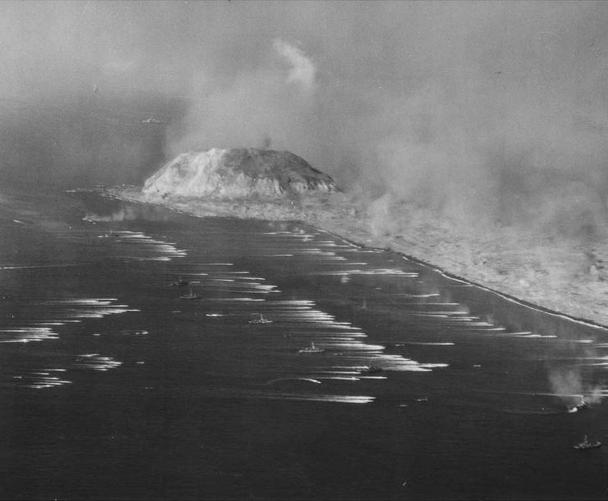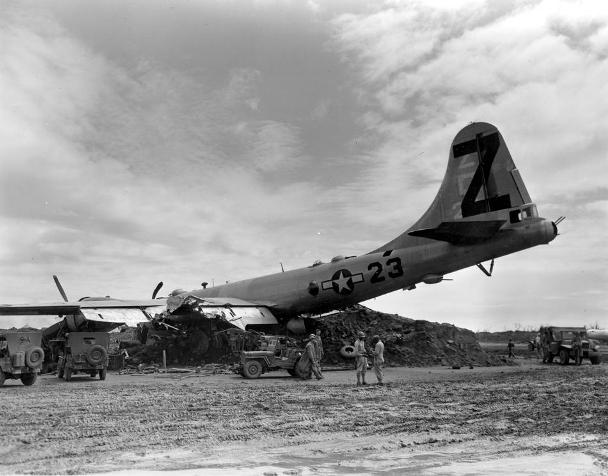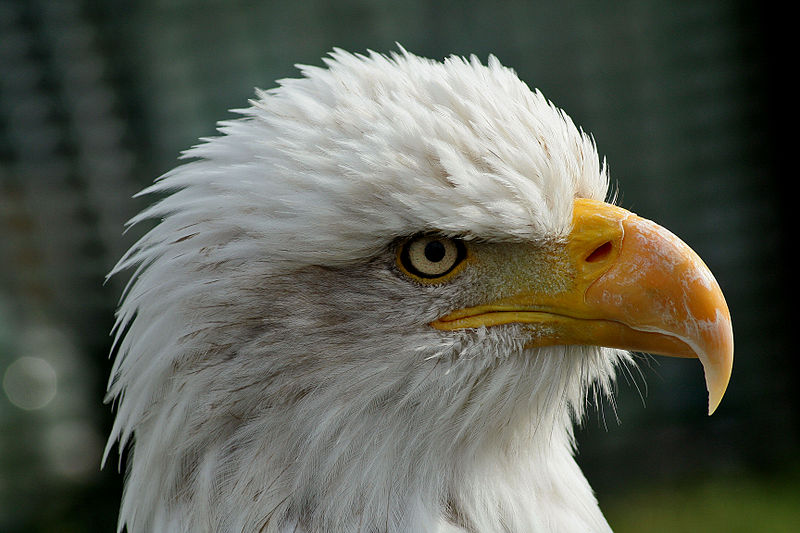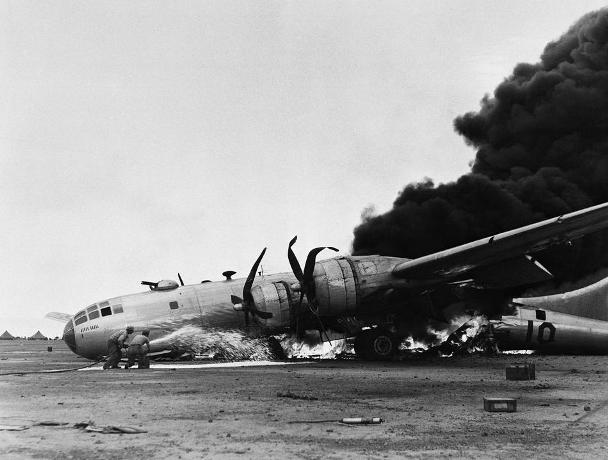| Lucas, Jack (14 Feb. 1928-5 June 2008), marine and Medal of Honor recipient, was born Jacklyn Harrell Lucas in Plymouth, North Carolina, the son of Louis Harold Lucas, a tobacco farmer, and Margaret Edwards. After the death of Louis Lucas in 1939, Margaret enrolled her son at Edwards Military Institute in Salemburg, North Carolina. The military environment provided young Jack discipline, a military aptitude, and a way of life he loved. Jack Lucas's life changed when the Japanese attacked Pearl Harbor on 7 December 1941. Although he was still a student at Edwards Military Institute, Lucas made repeated attempts to gain his mother's approval for his plan to join the marines. In August 1942, having failed to convince his  mother to lie for him, fourteen-year-old Lucas forged his mother's signature on an enlistment document that allowed him to join the marines at age seventeen. Standing 5 feet 8 inches in height and weighing 180 pounds, Lucas also possessed the muscular build to fool a military recruiter. mother to lie for him, fourteen-year-old Lucas forged his mother's signature on an enlistment document that allowed him to join the marines at age seventeen. Standing 5 feet 8 inches in height and weighing 180 pounds, Lucas also possessed the muscular build to fool a military recruiter. With his military school training Lucas excelled in his marine training in spite of his age. After completing basic training at Parris Island, South Carolina, in 1942, Lucas received machine gun training at Camp Geiger, North Carolina, in 1943. On 11 November 1943 Lucas arrived at Camp Catlin in Oahu, Hawaii. While in Hawaii military censors became aware from a letter he had written to his girlfriend that Lucas was fifteen years old. The marines removed him from his combat unit and assigned him to truck-driving duties. Angry with his assignment Lucas lashed out by getting into fights with other marines. During his assignment in Hawaii Lucas received a court-martial and spent a total of five months in a military stockade, pounding rocks on a diet of bread and water. On 10 January 1945 Lucas walked away from camp with a pair of boots and a set of fatigues, determined to find his way into a combat unit. At Pearl Harbor he joined other marines on a Higgins boat that was being used to shuttle men to their troopships. Lucas managed to stow away on USS Deuel as it steamed out of Pearl Harbor destined for Iwo Jima. On 8 February 1945 Lucas turned himself in and was assigned to a unit preparing for combat. Back in Hawaii he was classified as a deserter and reduced in rank to private. On 14 February Jack Lucas turned seventeen years old, and on 20 February found himself on Iwo Jima moving toward a Japanese airstrip northeast of Mount Suribachi, fighting for his life. On that day, along with three other men from a rifle squad, Lucas encountered tough Japanese resistance. Having taken cover in a trench, the rifle squad soon realized the Japanese were in another trench inches away. Lucas shot two Japanese soldiers before noticing two grenades near him in the trench. Throwing himself on the grenades and pushing them into the volcanic ash, Lucas shielded three other marines in the process; the heroic feat earned Lucas the Medal of Honor. One of the grenades exploded (the other did not), and Lucas suffered wounds in his right arm, right leg, and chest. Lucas's squad, thinking he was dead, moved on. Unable to move and with his clothes in shreds and his body covered with blood, Lucas waited until another company moved in and provided medical attention. On 26 February the Marine Corps removed the deserter classification from his record and his rank was restored to private first class. Over the next few weeks Lucas underwent numerous surgeries along with therapies and convalescence. His wounds were enormous, and more than two hundred pieces of metal would remain in his body. Declared physically unfit for military duty and discharged from the marines, Lucas went home to North Carolina in September 1945. to North Carolina in September 1945. On 5 October 1945 President Harry Truman awarded fourteen Medals of Honor in a ceremony at the White House. Lucas would become the youngest marine to receive the Medal of Honor. In this same ceremony the top marine ace of World War II, Gregory "Pappy" Boyington, was given the nation's highest military honor. Lucas took pride in the fact that General George Marshall sat next to his mother during the ceremony. Lucas's service record, which included seventeen convictions, was also cleared. Following his discharge from the Marine Corps in 1945, Lucas took a position with the Veterans Administration (VA) as a representative in Winston-Salem, North Carolina. Lucas worked off and on for the VA throughout the next ten years, during which time he graduated from high school, attended Duke University for two years, and earned a degree in business administration from North Carolina's High Point University in 1956. In 1961 Lucas returned to active military service at the age of thirty-three. He completed paratrooper training and was commissioned as army first lieutenant. Denied a combat assignment in Vietnam, Lucas soured on the military. He received his discharge in February 1965. soured on the military. He received his discharge in February 1965. Following his military service Lucas launched five meat shops in the Washington, D.C., area. Lucas raised his own beef on a ranch in Maryland, and for a time the operation was a success. However, financial negligence would lead to numerous problems for Lucas with the Internal Revenue Service. In January 1995 President Bill Clinton asked Lucas to be his guest for the State of the Union speech. Lucas sat in the gallery next to Hillary Clinton. In that address President Clinton reintroduced the nation to Lucas and his heroics at Iwo Jima fifty years earlier. Lucas married four times during his life, with the first three unions ending in divorce. He married his first wife, Helen, on the CBS program Bride and Groom on 26 March 1952. Lucas had four sons and a daughter from his first two wives. Lucas married his fourth wife, Ruby, in 1998. They had no children. Lucas died in Hattiesburg, Mississippi. |
|
The President of the United States takes pleasure in presenting the MEDAL OF HONOR to
PRIVATE FIRST CLASS JACKLYN H. LUCAS
UNITED STATES MARINE CORPS RESERVE
for service as set forth in the following CITATION:
For conspicuous gallantry and intrepidity at the risk of his life above and beyond the call of duty while serving with the First Battalion, Twenty-sixth Marines, Fifth Marine Division, during action against enemy Japanese forces on Iwo Jima, Volcano Islands 20 February 1945. While creeping through a treacherous, twisting ravine which ran in close proximity to a fluid and uncertain front line on D-plus+1 Day, Private First Class Lucas and three other men were suddenly ambushed by a hostile patrol which savagely attacked with rifle fire and grenades. Quick to act when the lives of the small group were endangered by two grenades which landed directly in front of them, Private First Class Lucas unhesitatingly hurled himself over his comrades upon one grenade and pulled the other one under him, absorbing the whole blasting force of the explosions in his own body in order to shield his companions from the concussion and murderous flying fragments. By his inspiring action and valiant spirit of self-sacrifice, he not only protected his comrades from certain injury or possible death, but also enabled them to rout the Japanese patrol and continue the advance. His exceptionally courageous initiative and loyalty reflect the highest credit upon Private First Class Lucas and the United States Naval Service
Video of Jack Lucas. |




















